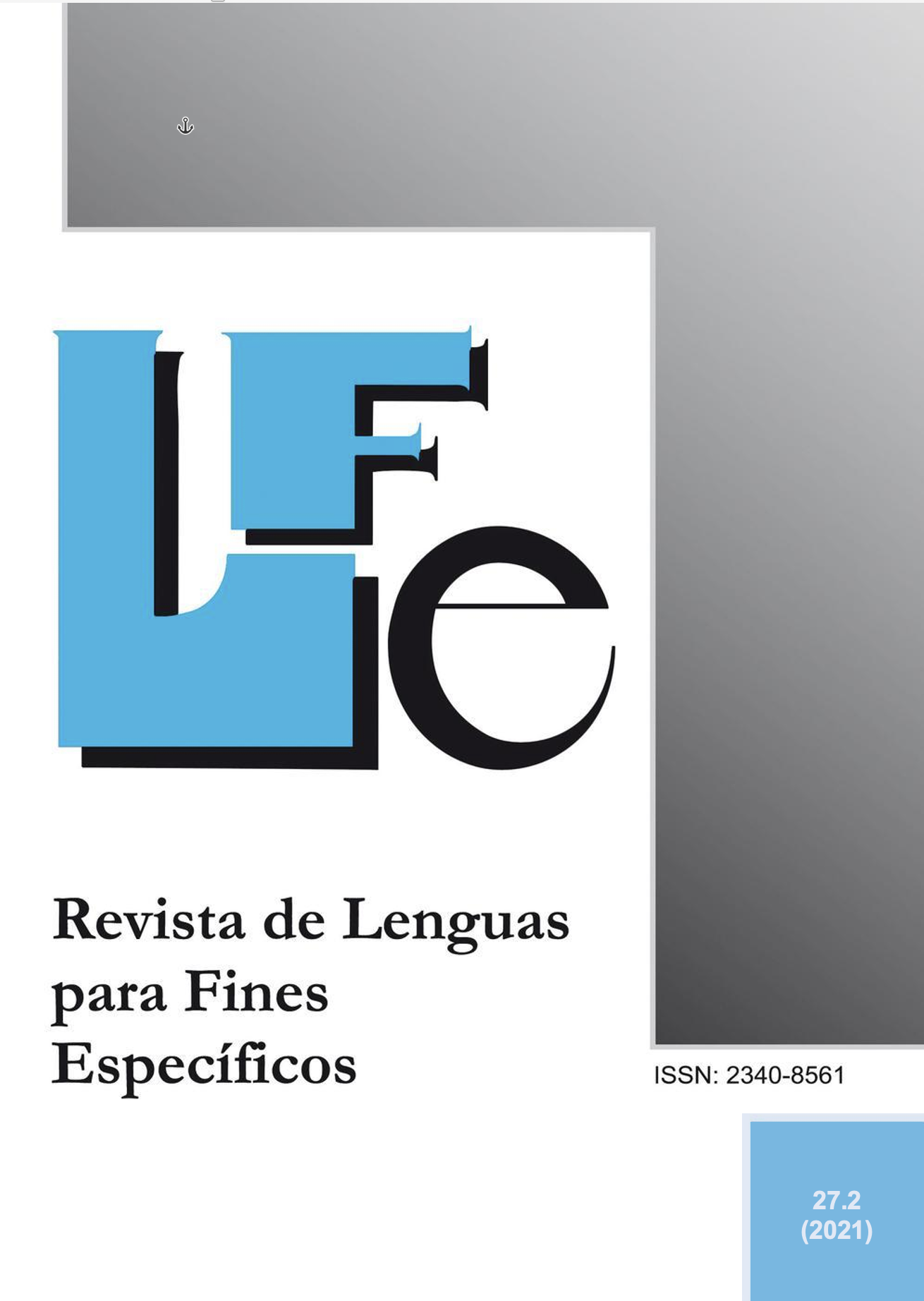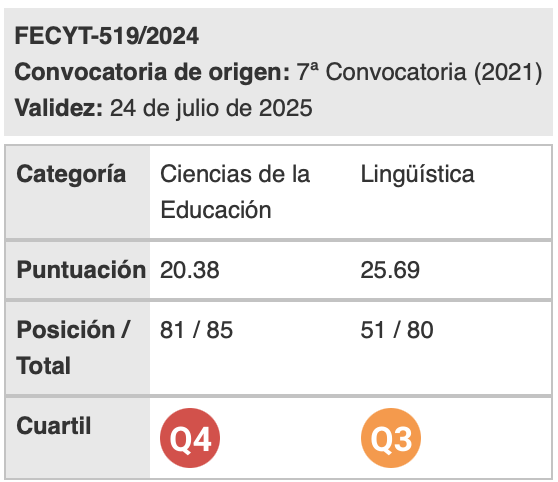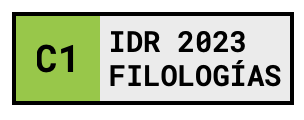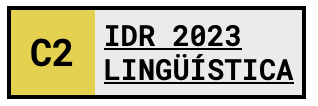The design and implementation of an English for Research Publication Purposes course: A corpus-based genre-analytic pedagogical intervention
Keywords:
ERPP training course, genre analysis, corpus-driven pedagogy, critical-pragmatic approachAbstract
The pressure on scholars who use English as an Additional Language (EAL) to publish their research in English-medium journals has recently been extended to those postgraduate students who seek to complete their PhD programmes. However, in higher education institutions worldwide, few training courses on English for Research Publication Purposes (ERPP) are being offered in order to provide students with effective rhetorical strategies which could facilitate the integration in their disciplinary communities. In this paper we report on the design and implementation of an ERPP training course for doctoral students in the fields of Arts and Humanities, which is based on the prior compilation of a corpus of research articles selected by the participants, a genre-analysis of the texts and a critical-pragmatic approach to the teaching of the socio-cultural features that underpin the whole process of publishing one’s research. On the basis of the analysis of the responses to a post-course evaluation questionnaire we also aim to examine the participants’ perceptions of the pedagogical intervention. The results indicate that, through their active participation in the course, the students acknowledge having gained a better understanding of the socio-pragmatic context involved in the publishing process, including awareness of the predominant rhetorical structures of research articles and abstracts, the prevalent academic practices in both national and international settings, and of potential variation in communicative strategies in their specific disciplinary areas.
Downloads
References
Adnan, Z. (2008). Discourse structure of Indonesian research article introductions in selected hard sciences. In S. Burgess & P. Martín (eds.), English as an Additional Language in research publication and communication, 39-63. Bern: Peter Lang.
Ammon, U. (2012). Linguistic inequality and its effects on participation in scientific discourse and on global knowledge accumulation –with a closer look at the problems of the second-rank language communities. Applied Linguistics Review 3: 333-355.
Basturkmen, H. (2009). Commenting on results in published research articles and master’s dissertations in Language Teaching. Journal of English for Academic Purposes 8: 241-251.
Belcher, D. (2007). Seeking acceptance in an English-only research world. Journal of Second Language Writing 16: 1-22.
Benesch, S. (2001). Critical English for academic purposes: Theory, politics, and practice. London: Lawrence Erlbaum Associates.
Bruce, I. (2008). Cognitive genre structures in Methods sections of research articles: A corpus study. Journal of English for Academic Purposes 7: 38-54.
Burgess, S. (2002). Packed houses and intimate gatherings: Audience and rhetorical structure. In J. Flowerdew (ed.), Academic discourse, 196-215. Harlow: Longman.
Burgess, S. & Cargill, M. (2013). Using genre analysis and corpus linguistics to teach research article writing. In V. Matarese (ed.), Supporting research writing: Roles and challenges in multilingual settings, 55-71. Oxford: Chandos Publishing.
Burgess, S., Gea-Valor, M. L., Moreno, A. I., & Rey-Rocha, J. (2014). Affordances and constraints on research publication: A comparative study of the language choices of Spanish historians and psychologists. Journal of English for Academic Purposes 14, 72-83.
Burgess, S., Martín, P., & Balasanyan, D. (2019). English or Spanish for research publication purposes? Reflections on a critical pragmatic pedagogy. In J. Corcoran, K. Englander, & L. Muresan (eds.), Pedagogies and policies for publishing research in English: Local initiatives supporting international scholars, 128-140. New York & London: Routledge.
Cargill, M., & O’Connor, P. (2013). Writing scientific research articles: Strategy and steps, 2nd ed. Oxford, UK: Wiley-Blackwell.
Cargill, M., Gao, X., Wang, X., & O'Connor, P. (2018). Preparing Chinese graduate students of science facing an international publication requirement for graduation: Adapting an intensive workshop approach for early-candidature use. English for Specific Purposes 52, 13-26.
Corcoran, J., & Englander, K. (2016). A proposal for critical-pragmatic pedagogical approaches to English for Research Publication Purposes. Publications 4 (1): 1-10. URL: https://doi.org/10.3390/publications4010006
Douglas, J. (2015). Developing an English for Academic Purposes course for L2 graduate students in the sciences. Across the Disciplines 12(3):1-14 URL: http://wac.colostate.edu/atd/graduate_wac/douglas2015.cfm
Ferguson, G. (2007). The global spread of English, scientific communication and ESP: Questions of equity, access and domain loss. Ibérica 13, 7-38.
Ferguson, G., Pérez-Llantada, C., & Plo, R. (2011). English as an international language of scientific publication: A study of attitudes. World Englishes 30, 41-59.
Fredrickson, K. & Swales, J. (1994). Competition and discourse community: Introductions from Nysvenska studies. In B. L. Gunnarsson, P. Linell, & B. Nordberg (eds.), Text and talk in professional contexts, 9-21. Sweden: Uppsala.
Feak, C. B., & Swales, J. (2010). Writing for publication: Corpus-informed materials for postdoctoral fellows in perinatology. In N. Harwood (ed.), English language teaching materials: Theory and practice, 279-300. Cambridge: Cambridge University Press.
Flowerdew, J., & Wang, S. H. (2017). Teaching English for Research Publication Purposes with a focus on genre, register, textual mentors and language re-use: A case study. In J. Flowerdew, & T. Costley (eds.), Discipline-specific writing: Theory into practice, 144-161. London: Routledge.
Harwood N. & Hadley, G. (2004). Demystifying institutional practices: Critical pragmatism and the teaching of academic writing. English for Specific Purposes 23, 355–377.
Hyland, K. (2000). Disciplinary discourse. Social interactions in academic writing. Harlow: Pearson Education.
Janssen, G., & Restrepo, S. (2019). A utilization-focused program evaluation of an ERPP tutoring service at one Colombian university. In J. Corcoran, K. Englander, & L. Muresan (eds.), Pedagogies and policies for publishing research in English: Local initiatives supporting international scholars, 19-35. New York & London: Routledge.
Jiang, F. & Hyland, K. (2020). Prescription and reality in advanced academic writing. Ibérica 39, 15-42.
Lee McKay, S. (2002). Teaching English as an international language: Rethinking goals and perspectives. New York: Oxford University Press.
León-Pérez, I. K., & Martín, P. (2016). On the importance of a genre-based approach in the teaching of English for Medical Purposes. Language Learning in Higher Education 6 (1), 95-117.
Li, Y., & Flowerdew, J. (2020). Teaching English for Research Publication Purposes (ERPP): A review of language teachers’ pedagogical initiatives. English for Specific Purposes 59, 29-41.
Lillis, T., & Curry, M. J. (2010). Academic writing in a global context: The politics and practices of publishing in English. London/New York: Routledge.
Loi, C. K. (2010). Research article introductions in Chinese and English: A comparative genre-based study. Journal of English for Academic Purposes 9, 267-279.
Martín, P. (2005). The rhetoric of the abstract in English and Spanish scientific discourse: A cross-cultural genre-analytic approach. Bern: Peter Lang.
Martín, P. & León-Pérez, I. (2014). Convincing peers of the value of one’s research: A genre analysis of rhetorical promotion in academic texts. English for Specific Purposes 34, 1-13.
Martín, P., Rey-Rocha, J., Burgess, S., & Moreno, A. (2014). Publishing research in English-language journals: Attitudes, strategies and difficulties of multilingual scholars of Medicine. Journal of English for Academic Purposes 16, 57-67.
Martín, P. & León-Pérez, I. (2017). Disseminating research internationally: Intra-subdisciplinary rhetorical structure variation in Immunity and Allergy research articles. In M. Cargill & S. Burgess (eds.), Publishing research in English as an Additional Language: Practices, pathways and potentials, 151-168. Adelaide: University of Adelaide Press.
Moreno, A. I., Rey-Rocha, J., Burgess, S., López-Navarro, I., & Sachdev, I. (2012). Spanish researchers’ perceived difficulty writing research articles for English-medium journals: The impact of proficiency in English versus publication experience. Ibérica 24, 157-184.
Moreno, A. I. & Swales, J. M. (2018). Strengthening move analysis methodology towards bridging the function-form gap. English for Specific Purposes 50, 40-63.
Morley, J. (2019). Academic phrasebank. University of Manchester. URL: http://www.phrasebank.manchester.ac.uk/
Mur-Dueñas, P. (2014). ‘The main contribution to this study is…’: An analysis of statements of contribution in English published research articles and L2 manuscripts. Journal of Writing Research, 5 (3), 271-283.
Myers, G. (1996). Strategic vagueness in academic writing. In E. Ventola & A. Mauranen (eds.), Academic writing: Intercultural and textual issues, 3-18. Amsterdam: John Benjamins.
Ozturk, I. (2007). The textual organisation of research article introductions in applied linguistics: Variability within a single discipline. English for Specific Purposes, 26, 25-38.
Paltridge, B. (2018). Writing for publication. In L. Woodrow (ed.), Introducing course design in English for Specific Purposes, 228-233. New York & London: Routledge.
Salager-Meyer, F. (2008). Scientific publishing in developing countries: Challenges for the future. Journal of English for Academic Purposes 7, 121-132.
Samraj, B. (2002). Introductions in research articles: Variations across disciplines. English for Specific Purposes, 21, 1-17.
Sheldon, E. (2018). Knowledge construction in academia: A challenge for multilingual scholars. Oxford, UK: Peter Lang.
Swales, J. M. (1990). Genre analysis: English in academic and research settings. Cambridge, UK: Cambridge University Press.
Swales, J. M. (2004). Research genres: Explorations and applications. Cambridge, UK: Cambridge University Press.
Swales, J. M., & Feak, C. B. (2000). English in today’s research world: A writing guide. Ann Arbor, Mich., University of Michigan Press/ESL.
Downloads
Published
How to Cite
Issue
Section
License
Authors who publish with this journal agree to the following terms:
- Authors retain copyright and grant the journal right of first publication with the work simultaneously licensed under a Creative Commons Attribution License that allows others to share the work with an acknowledgement of the work's authorship and initial publication in this journal.
- Authors are able to enter into separate, additional contractual arrangements for the non-exclusive distribution of the journal's published version of the work (e.g., post it to an institutional repository or publish it in a book), with an acknowledgement of its initial publication in this journal.
- Authors are permitted and encouraged to post their work online (e.g., in institutional repositories or on their website) prior to and during the submission process, as it can lead to productive exchanges, as well as earlier and greater citation of published work (See The Effect of Open Access).

Revista de Lenguas para fines específicos is licensed under a Creative Commons Reconocimiento-NoComercial-SinObraDerivada 4.0 Internacional License.

























